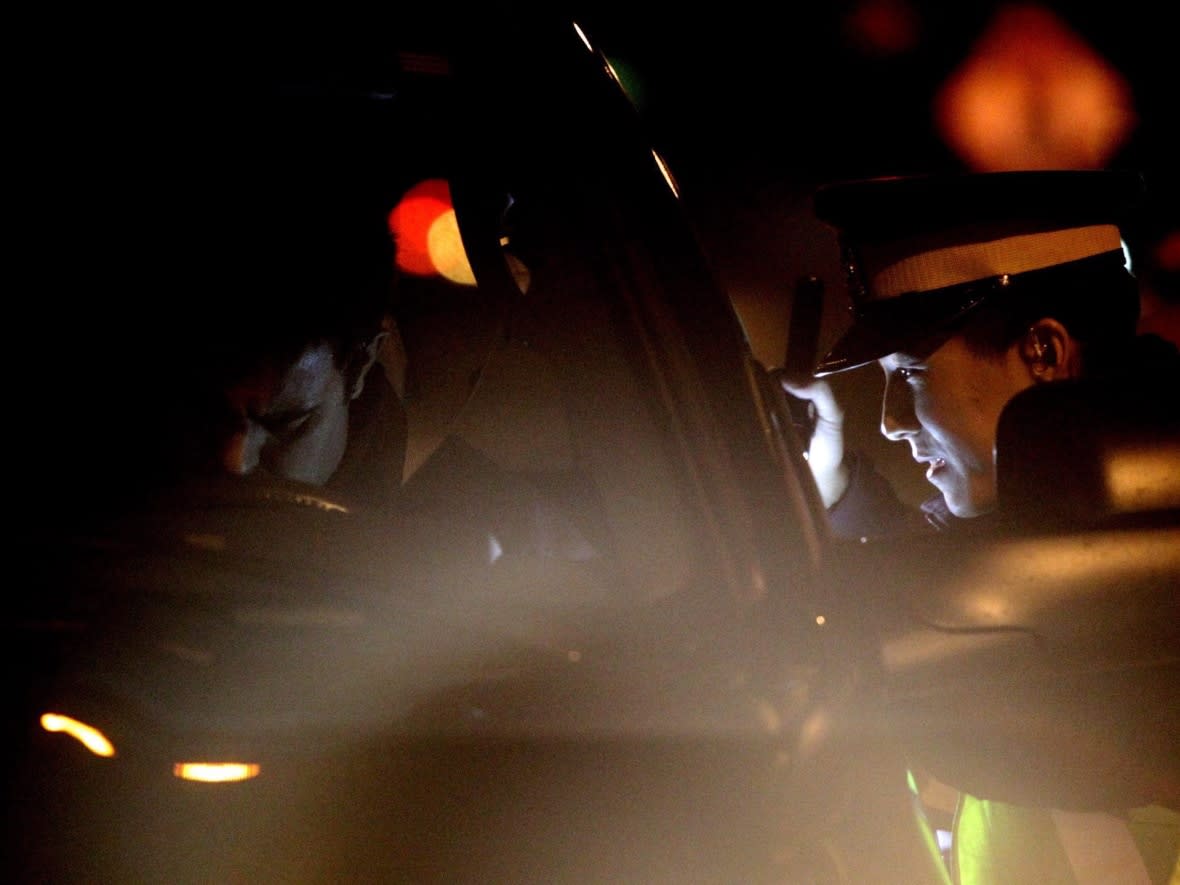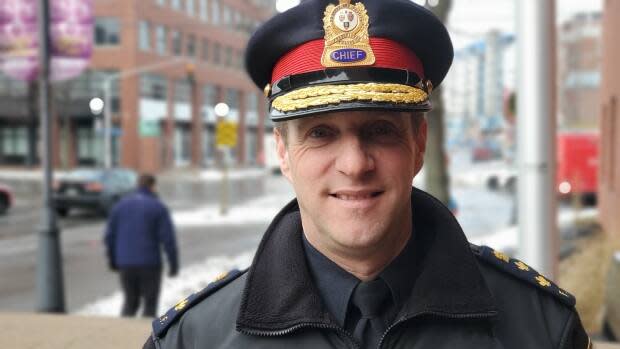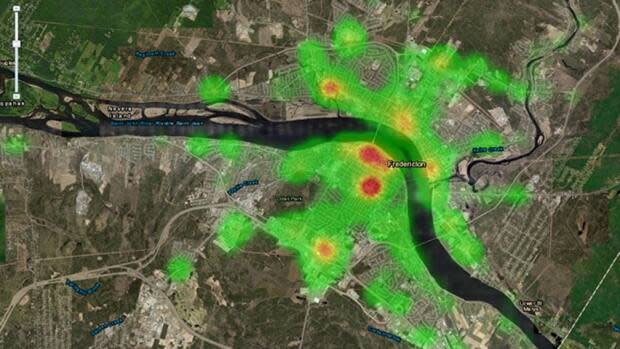Fredericton hits four-year high for impaired driving-related offences

The holidays stir up memories for Fredericton Police Force Chief Martin Gaudet. And not all of them are good.
Seasonal ad campaigns warning of the dangers of impaired driving remind the 28-year police veteran of his younger days on the front lines, notifying next of kin of fatal crashes.
"The officers and the firefighters and the paramedics going to those scenes — you can't unsee it, you can't unsmell it. And you have to tell the families that their loved ones won't be coming home," he said.
"That stuff is real. … And it's permanent."
That's why Gaudet said it's so "frustrating" to see impaired driving-related offences in Fredericton the highest they've been in four years.

The force has arrested 199 people, as of Dec. 16, up from 166 in 2021 — a nearly 20 per cent increase.
That includes offences such as driving over the legal limit of 80 milligrams of alcohol per 100 millilitres of blood, refusing a breathalyzer, and drug-impaired operation of a vehicle.
"It's creeping up the wrong direction," said Gaudet, noting there were 127 arrests in 2020, at the beginning of the COVID-19 pandemic, and 162 in 2019, pre-pandemic.
Impaired Driving Incident Reports
In Saint John, impaired driving incidents have remained relatively stable this year at 80 between Jan. 1 and Nov. 30, compared to 86 during the same period last year, according to the Saint John Police Force.
That's up from 67 in 2020.
"It is possible that 2020 is lower due to factors related to [the] COVID-19 pandemic," such as the closure of bars and restaurants," said Staff Sgt. Sean Rocca.
In 2019, pre-pandemic, there were 103 impaired driving incidents in the Port City.
Impaired Driving Incident Reports
New Brunswick RCMP could not provide any 2022 statistics for the numerous jurisdictions they serve across the province. That data won't be compiled until their annual report in 2023, said spokesperson Cpl. Hans Ouellette.
In 2021, there was about a 29 per cent drop in impaired-driving offences, to 2,193, from 3,096, while 2020 saw roughly a 1.7 per cent drop from the 3,149 offences recorded in 2019.
Of last year's 2,193 offences, 752 resulted in impaired driving charges, down from 849 charges in 2020, and 873 in 2019.

The numbers are encouraging, said Ouellette, but "a year doesn't make … a trend," and many factors can influence statistics from year to year, such as whether there is more or less enforcement, and whether there are more or fewer people on the roads.
One statistic is straightforward, however — 21 people were killed in crashes that involved alcohol or drug impairment in jurisdictions covered by the RCMP last year, said Ouellette.
There's too many people dying on our roadways. - Hans Ouellette, New Brunswick RCMP spokesperson
"It continues to be the number 1 criminal cause of death on our roads," he said.
"There's too many people dying on our roadways … and you know, there's too many families that are affected by this."
Ruins lives and families forever
Gaudet struggles to understand why anyone continues to take such risks, particularly in increasing numbers in the province's capital.
If an impaired driver gets into a collision, they could injure themselves or others, or kill themselves or others, he said.
They could have their car impounded, lose their licence for a period, be ordered to pay substantial fines, or end up behind bars for years.
"And, of course, if you kill someone, then you've ruined lives and families forever."
With all the education and awareness about impaired driving, Gaudet contends there's no excuse for it. There's always an alternative, such as arranging a designated driver, calling a taxi, staying somewhere overnight, or not drinking to begin with.
It's "completely preventable," he said, and "safety is everyone's responsibility."

Still, Gaudet hopes ongoing education campaigns and partnerships with MADD (Mothers Against Drunk Driving) Greater Fredericton Area and MADD Canada will help discourage impaired driving and make the roads safer.
The force, for example, sometimes posts signs around the city that read, "Impaired driver caught here," he said, and recently conducted a weekend "blitz" that resulted in more than 100 vehicle checks.
"Those things work. They make a difference in our community. People hear about it, they [hear] the buzz and hopefully it changes their perception," Gaudet said.
Most offenders young men
The target demographic for advertising campaigns is young men, who represent the majority of offenders in Fredericton, he said.
Of the 560 impaired-related offences recorded between 2019 and 2022, where the force provided the gender, men in their 20s and 30s account for half, at 142 and 135, respectively.
"That's the audience that we need to have conversations with, in schools and during public blitzes," said Gaudet.
Number of impaired drivers in age range and by gender
Males in general account for more than three-quarters of the city's impaired offences, at 432, while the other 128 were committed by females, the force's statistics show.
Among the 128 cases involving females, women in their 20s and 30s, like men, were the biggest offenders, representing 51 and 35 of the cases respectively, or about 67 per cent combined.
Saint John has seen similar trends, according to Rocca. Males represent 77 per cent of impaired drivers, based on 2022 and 2021 averages. The dominant age range, representing more than a quarter of all offenders, is 26 to 35, while the 36 to 45 age group and 46 to 55 age group each represent 21 per cent.
Percentage of Impaired Drivers by Gender (2021 & 2022 Averages)
Where are people driving impaired?
In Fredericton, the offences occur throughout the city, according to a heat map the force generated for 2022.
It highlights in green areas where people have been arrested for impaired driving and shows a wide swath of green covering much of the city. Higher concentrations of offences, illustrated in yellow, and hot spots, illustrated in red, are largely in the downtown area.

Gaudet believes police have all the tools they need to combat impaired driving, including 2018 changes to the Criminal Code that allow police to demand a breath sample at the roadside from any driver who has been lawfully stopped, whether or not they suspect the driver is impaired.
This mandatory alcohol screening is "an incredible tool," he said, noting failure to comply with the demand will also result in criminal charges, which carry the same or greater penalties as driving while impaired.
The force does, however, encourage people to call 911 if they think they've observed an impaired driver and can safely pull over, said Gaudet.
"We want to make sure that the community understands that we want their help, and we need their help," because officers can't be everywhere, he said.
Witnesses should provide as much information as possible, including their location and the suspect vehicle's direction of travel, a description of the suspect vehicle, such as the colour, make, model, and licence plate number, if possible, as well as a description of the driver, if possible.
"I just hope that people remember that when they go out during the holiday season, or any other part of the year — if you drink, don't drive," said Gaudet. "If you're going to take drugs, don't drive. Make a plan."
Teen lost friend in crash
Charles Mollins, president of MADD South Eastern New Brunswick, said it's a message he tried to instill with his son Andrew over the years.
Mollins always told him, "If you're going out [and need a ride] … call me. I don't care what time you call," he said.
I don't mind one sleepless night. I don't want sleepless nights for the rest of my life. - Charles Mollins, MADD South Eastern New Brunswick president
"I don't mind one sleepless night. I don't want sleepless nights for the rest of my life."
Andrew always did call, said Mollins, but he learned first-hand the devastation impaired driving can cause. His high school friend was killed in a crash about 10 years ago, the night of a party, before they were supposed to head off to university.
"They went looking for somebody else that was extremely impaired and they ended up getting in an 'incident,'" said Mollins. "Impaired driving is not an 'accident' — it's an 'incident,'" he stressed, as an accident is an event that occurs without apparent cause.
The friend's death is why Mollins became involved with MADD. He saw how the loss affected his son. It changed him.
"It was emotional for him and we, my wife and I, both saw that and we thought this would be a good way to try to assist him and other affected families by raising awareness," he said.

MADD Canada's annual Project Red Ribbon campaign, which runs from Nov. 1 to the first Monday of the new year, for example, sees local chapters distribute thousands of red ribbons for people to tie to their vehicles, key chains, purses, briefcases and backpacks as a symbol of their commitment to drive sober.
Mollins says his group has hung red ribbons at the city markets in Moncton and Dieppe, and at car shows and craft sales in the Moncton area.
He believes MADD's prevention message is getting through.
"People are, I think, starting to think about it more. And maybe it's just starting to sink in a little bit," he said. "I'm hoping people are starting to realize it's not really the thing to do."
Takes issue with cannabis laws
Still, cannabis laws have made it tougher for police and MADD officials, according to Mollins, because, he contends, "there's more people on the roads driving impaired."
He lives in a rural area and said there are as many drug products on the side of the road as there are beer cans. "So that gives you an indication of how much is going on."
In Fredericton, of the 199 arrests so far this year, seven (or about 3.5 per cent) involved impairment by drugs and an eighth case lists both alcohol and drugs, which means either the driver was intoxicated by both or police are still waiting for blood results. Of the 166 arrests in 2021, 10 people were impaired by drugs, or about six per cent, according to the statistics.
In Saint John, the majority of impaired arrests are still for impairment by alcohol, said Rocca. About 72 per cent for operation of a vehicle over 80 mg, 16 per cent are for breathalyzer refusals, and 12 per cent are for drug impairment.
The RCMP spokesperson was unable to provide a breakdown of alcohol versus drugs, but stressed how dangerous it is to get behind the wheel impaired, regardless of the substance.
"You just don't have the capacity to be able to concentrate on the roads," said Ouellette. "These are big machines and at high speeds, you know, they can have very tragic consequences.
"Even one fatality … is one too many."


